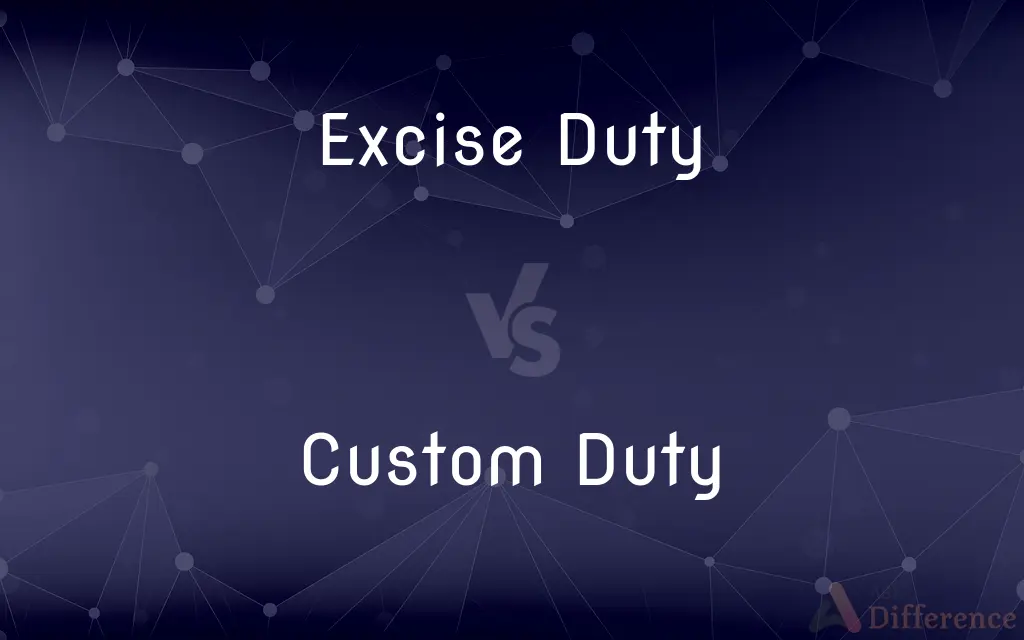Excise Duty vs. Custom Duty — What's the Difference?
By Tayyaba Rehman — Published on October 9, 2023
Excise Duty is a tax on goods produced within a country; Custom Duty is a tax on imports and exports between countries.

Difference Between Excise Duty and Custom Duty
Table of Contents
ADVERTISEMENT
Key Differences
Furthermore, Excise Duty's rate can vary based on various factors like the type of product, its intended use, and its potential societal impact. In contrast, Custom Duty rates can vary based on international agreements, trade policies, and the nature of the goods being imported or exported.
Tayyaba Rehman
Oct 09, 2023
Excise Duty is a form of indirect tax that is levied on goods that are manufactured or produced within a country. This means that it's a domestic tax, primarily on goods like alcohol, tobacco, and gasoline. Custom Duty, on the other hand, is a tax that is imposed on goods when they are imported into or exported out of a country. This tax is used to regulate international trade and protect domestic industries.
Tayyaba Rehman
Oct 09, 2023
In essence, while both Excise Duty and Custom Duty are forms of taxation, they target different stages of a product's life cycle. Excise Duty is concerned with domestically produced goods, whereas Custom Duty focuses on the international movement of goods.
Tayyaba Rehman
Oct 09, 2023
Both Excise Duty and Custom Duty serve different purposes within the financial framework of a nation. Excise Duty aims to generate revenue for the government and sometimes, to discourage the consumption of certain products. Custom Duty, conversely, is used not just for revenue generation but also to control the movement of goods across borders, ensuring that domestic industries get fair opportunities as compared to foreign ones.
Tayyaba Rehman
Oct 09, 2023
Comparison Chart
ADVERTISEMENT
Purpose
Revenue generation; may discourage consumption of certain products
Revenue generation; protect domestic industries; regulate trade
Tayyaba Rehman
Oct 09, 2023
Applicability
Goods produced within a country
Goods moving across international borders
Tayyaba Rehman
Oct 09, 2023
Determinants
Product type, intended use, societal impact
International agreements, nature of goods, trade policies
Tayyaba Rehman
Oct 09, 2023
Examples
Alcohol, tobacco, gasoline
Electronics, cars, luxury goods imported or exported
Tayyaba Rehman
Oct 09, 2023
Definitions
Excise Duty
A tax based on the production, sale, or consumption of a product within a country.
Manufacturers often pass the cost of Excise Duty onto consumers.
Tayyaba Rehman
Oct 01, 2023
ADVERTISEMENT
Custom Duty
An instrument to protect domestic industries.
The Custom Duty on foreign cars was increased to support local manufacturers.
Tayyaba Rehman
Oct 01, 2023
Excise Duty
A tax on goods manufactured domestically.
The rise in the Excise Duty on cigarettes led to an increase in their prices.
Tayyaba Rehman
Oct 01, 2023
Custom Duty
A fiscal charge based on international trade policies.
Businesses consider Custom Duty when calculating the cost of international trade.
Tayyaba Rehman
Oct 01, 2023
Excise Duty
A levy on certain locally produced items.
To promote clean energy, the Excise Duty on coal was increased.
Tayyaba Rehman
Oct 01, 2023
Custom Duty
A levy to regulate international trade.
Due to trade agreements, the Custom Duty on certain products was reduced.
Tayyaba Rehman
Oct 01, 2023
Excise Duty
A fiscal tool to control domestic production.
An Excise Duty is often used to regulate the alcohol industry.
Tayyaba Rehman
Oct 01, 2023
Custom Duty
A tax on goods crossing international borders.
Imported electronics often come with a high Custom Duty.
Tayyaba Rehman
Oct 01, 2023
Excise Duty
A domestic indirect tax on specific goods.
The government introduced a new Excise Duty on luxury cars.
Tayyaba Rehman
Oct 01, 2023
Custom Duty
A tax on both imports and exports of a country.
The new trade policy altered the Custom Duty structure for several goods.
Tayyaba Rehman
Oct 01, 2023
FAQs
Can Excise Duty vary for different products?
Yes, Excise Duty can vary based on the product type, its intended use, and its societal impact.
Tayyaba Rehman
Oct 09, 2023
Is Excise Duty applicable to imported goods?
No, Excise Duty is levied on goods produced within a country. Imported goods may attract Custom Duty.
Tayyaba Rehman
Oct 09, 2023
Why is Custom Duty imposed on imported goods?
Custom Duty protects domestic industries, regulates trade, and generates revenue.
Tayyaba Rehman
Oct 09, 2023
Do trade agreements affect Custom Duty?
Yes, international trade agreements can influence Custom Duty rates.
Tayyaba Rehman
Oct 09, 2023
How does Custom Duty support domestic industries?
By imposing taxes on imports, Custom Duty ensures domestic products remain competitive.
Tayyaba Rehman
Oct 09, 2023
What is the primary purpose of Excise Duty?
Excise Duty aims to generate government revenue and, in some cases, discourage consumption of certain goods.
Tayyaba Rehman
Oct 09, 2023
Can a product be subjected to both Excise Duty and Custom Duty?
Yes, a domestically produced item (with Excise Duty) can attract Custom Duty if exported.
Tayyaba Rehman
Oct 09, 2023
How does Custom Duty affect international trade?
Custom Duty can influence trade balances, product pricing, and trade relations between countries.
Tayyaba Rehman
Oct 09, 2023
Which body typically sets the rates for Excise Duty?
The national or federal government usually determines Excise Duty rates.
Tayyaba Rehman
Oct 09, 2023
Is Excise Duty applicable to all manufactured goods?
Not necessarily; it typically applies to specific goods like alcohol, tobacco, and gasoline.
Tayyaba Rehman
Oct 09, 2023
Author Spotlight

Written by
Tayyaba RehmanTayyaba Rehman is a distinguished writer, currently serving as a primary contributor to askdifference.com. As a researcher in semantics and etymology, Tayyaba's passion for the complexity of languages and their distinctions has found a perfect home on the platform. Tayyaba delves into the intricacies of language, distinguishing between commonly confused words and phrases, thereby providing clarity for readers worldwide.

















































